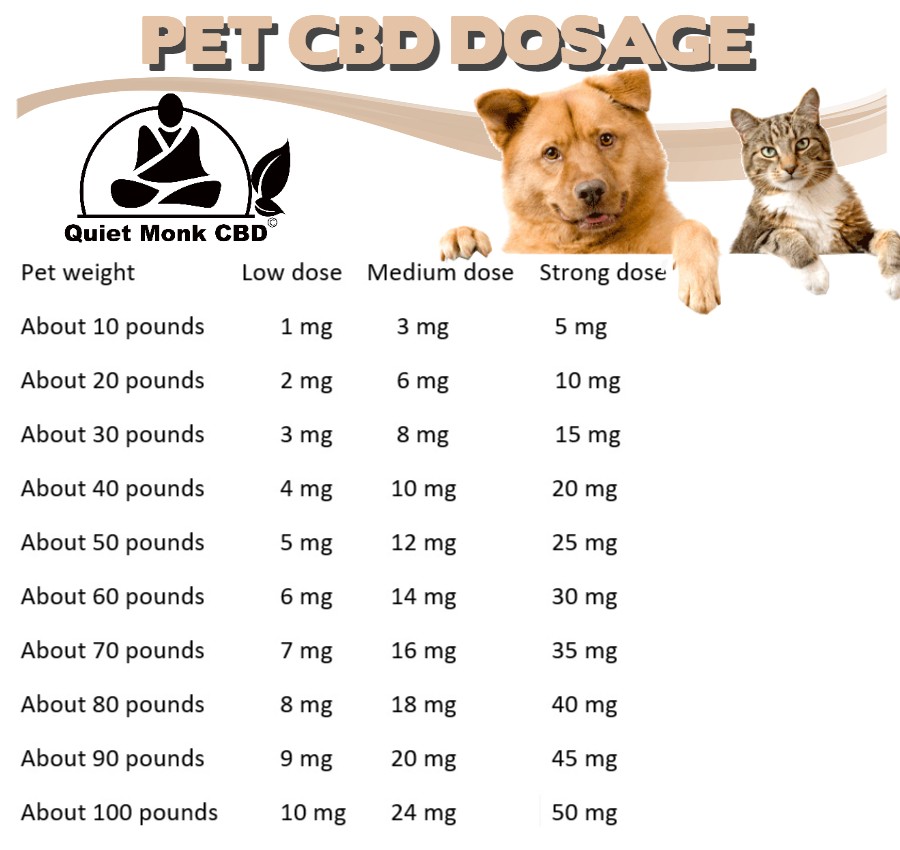
The adoption of cannabidiol, or CBD, as an all-natural solution for a range of animal health problems has skyrocketed in current times. More and more, pet owners are looking to cannabidiol (CBD) as a solution for their beloved animals’ health problems, whether it’s anxiety, chronic pain, seizures, or skin issues. However, there is a subtlety to be aware of when giving CBD to animals; knowing the right dose is essential for the drug’s safety and efficacy.
Understanding CBD
Understand what cannabidiol (CBD) is and how it affects animals before moving on to dose recommendations. Cannabidiol, or CBD, is an ingredient in hemp that does not produce intoxication. It communicates with the endocannabinoid system (ECS), an intricate network of receptors and neurotransmitters crucial in controlling a wide range of physiological functions.
How Does CBD Work in Animals?
By attaching to certain receptors, cannabidiol (CBD) mainly communicates with the endocannabinoid system (ECS). In addition to the central nervous system and immune system, these receptors can be located in peripheral tissues and the brain as well. Binding to these receptors allows CBD to affect a variety of processes, including hunger, inflammation, mood, and pain perception.
Due to the striking similarity between the ECS in animals and humans, CBD has great promise as a natural treatment for several ailments. Animals can experience improved health and balance when they take CBD, as it affects the endocannabinoid system (ECS).
The Legal Status of CBD for Pets
Cannabidiol (CBD) for animals is subject to varying levels of legality depending on the jurisdiction. While it may be widely available and legal in some places, it may be subject to strict regulations or even banned entirely in others. Before administering CBD to their dogs, owners should familiarize themselves with the regulations in their jurisdiction and be sure to follow them.

Advantages of Cannabidiol for Animals
CBD is an adaptable choice for treating a wide range of health concerns because of its many possible advantages for animals. Here are a few of the main ways that CBD helps animals:
1. Pain Relief
A frequent use of cannabidiol (CBD) in animal medicine is the alleviation of pain. Whether it’s the acute pain of an accident or the chronic pain of a condition like arthritis, cannabidiol (CBD) shows promise in reducing pain and improving the quality of life for animals.
Evidence from animal research suggests that cannabidiol (CBD) may alleviate pain by lowering inflammation and blocking signals from the endocannabinoid system (ECS). The movement and comfort of many dogs have been significantly enhanced after starting CBD medication.
2- Relieving Anxiety and Stress
The anxiety and tension that people experience may also affect animals. A number of studies have shown that cannabidiol (CBD) can assist dogs overcome anxiety, including phobias of thunderstorms and separation anxiety.
CBD has an effect on the receptors in the brain that are responsible for anxiety and stress. By modulating these receptors, cannabidiol (CBD) helps dogs cope with stressful situations by decreasing the intensity of anxiety-related behaviors.
3. Effects on Inflammation Reduction
The underlying cause of many animal health concerns is inflammation. Conditions such as irritable bowel syndrome, skin irritations, allergies, and similar ones can cause significant discomfort. Because of its anti-inflammatory properties, CBD is helpful in the treatment of several diseases.
When CBD binds to the ECS, it blocks the production of molecules that promote inflammation. This reduces inflammation and the symptoms associated with it. This has the potential to alleviate inflammatory disorders in dogs significantly.
4. Controlling Seizures
Animals with epilepsy or seizures can be difficult to treat. The effectiveness and safety of conventional seizure drugs are questionable, and they are not without potential side effects. CBD has recently gained attention as a possible substitute for conventional veterinary seizure therapies, particularly when these fail to control the seizures.
Research on animals with epilepsy has revealed that cannabidiol (CBD) can lessen the frequency and intensity of seizures. As a result, CBD medication shows promise for dogs suffering from epilepsy since some owners have claimed total seizure remission after using it.
5. Encouraging a State of Total Health
In addition to helping with some ailments, CBD can have a positive impact on an animal’s general health. Cannabidiol (CBD) helps aid digestion, strengthen the immune system, and boost general health by modifying the endocannabinoid system (ECS), which is essential for homeostasis.
As a wellness supplement, many pet owners have begun to include CBD in their pets’ regular routines in the hopes that it would help them avoid health problems and live longer.
Variables Impacting Dosage
After going over some of the possible advantages of CBD for animals, we can go on to discuss the important elements that determine the right dose for your pet. A number of factors must be carefully considered in order to arrive at the correct CBD dose, including:

1. Distinctions Between Species and Breeds
Cannabidiol (CBD) sensitivity may vary among animal species and breeds. A dog’s or cat’s reaction to CBD, for instance, may vary depending on factors such as the animal’s size, age, and genetic composition, as well as its metabolism.
These variations must be considered in order to arrive at the correct dose. To illustrate the point, the dosage needed to accomplish the same effect in a large breed dog can be higher than in a small breed dog. In a similar vein, the dosage required for a cat compared to a dog of the same weight and size could vary.
2. The Animal’s Mass and Measurements
When determining the correct dosage of CBD for your pet, it is essential to consider their weight and size. Dosages should be adjusted accordingly; smaller animals usually need lower dosages, and larger animals need greater ones.
An initial dosage may be calculated using a formula that takes your pet’s weight into account. As a general rule, it’s best to give people between 0.25 and 0.5 milligrams of CBD for every pound of body weight. So, 5–10 milligrams of CBD could be a good starting point for a 20-pound dog.
It should be remembered that this is only a baseline and that specific cases may necessitate modifications. You may fine-tune the dosage by monitoring your pet’s reaction to the CBD and seeking advice from a veterinarian.
3. The Illness’s Severity
The most effective dosage will depend on the severity of the ailment that you are trying to treat with CBD. Higher dosages may be necessary for pets with more severe symptoms to feel better, while lower amounts may be sufficient for pets with less severe symptoms.
A canine suffering from chronic arthritic pain, for instance, could want a greater CBD dose than an occasional anxious dog. It is critical to monitor your pet’s health and make dose adjustments as needed.
4- Type of CBD Product
CBD is available in a wide variety of forms, including oils, snacks, pills, and lotions for the skin. The speed and convenience of ingestion of CBD are both affected by the product type you select.
CBD pet oil: CBD oil is a popular choice for pets looking for a CBD supplement. It dissolves quickly when placed beneath the tongue or when mixed with food or sweets. You can measure exactly how much your pet needs with oils because of how accurate the dose control is.
CBD Infused Treats: If you’re looking for an easy method to give your pet CBD, these treats are a great choice. These snacks are perfect for pets who aren’t sure they can handle oil because they come in pre-dosed portions.
CBD Capsules: A convenient and regular approach to providing your pet CBD is through capsules. They are available in different strengths, so you can pick the dosage that is right for your pet.
Pet Topical CBD: Some cannabidiol (CBD) products are specifically formulated to be administered topically to the skin. Localized problems, such as skin irritations or joint discomfort, are usually treated with these products.
While selecting a CBD product, keep in mind both your pet’s tastes and the ailment you’re trying to alleviate. For instance, a topical CBD product might be better suited for your pet’s skin problem, while an oil or treat could be better for overall anxiety.
5-Personal Sensitivity
Animals, like people, can have different levels of CBD sensitivity. Dosage effectiveness varies from pet to pet; some may need more medication, while others may do just fine with less. So, it’s best to watch your pet’s reaction attentively and start with a smaller dose, then raise it as necessary.
Factors including heredity, metabolism, and other medical issues might impact an individual’s susceptibility. Dosage adjustments are required in the event of side effects or non-improvement.
Recommended Dosage for Canines
Following our discussion of the most important variables affecting CBD dose, we will go on to canine dosing recommendations. There is no universally accepted method of CBD dosage because dogs range in size, age, and breed. To get you started, here are some broad rules:

1. Initial Dosage Guidelines
It is recommended to start your dog on a lesser dose of CBD and raise it gradually if necessary when introducing it to their system. To begin, it’s recommended to take 0.25 to 0.5 milligrams of CBD per kilogram of body weight. As a result, the recommended starting dose of CBD for a 30-pound dog is between 7.5 and 15 milligrams.
This is only a cautious starting point, and different dogs may have different needs and sensitivities, so it’s important to adjust the dosage accordingly. You can see how your dog reacts to the medication by starting with a lesser dose and increasing it as needed.
2. Modifying Dosage according to Body Mass Index
A dog’s weight is a major factor in deciding the right dosage of CBD, as already stated. The following is a list of weight categories used to determine dose ranges:
- Dogs under 20 pounds: 5–10 milligrams of CBD is a good starting point.
- For medium-sized dogs (21-50 lbs.), start with 10–20 milligrams of CBD.
- Start with 20–40 milligrams of CBD for large dogs (51–100 pounds).
- Large Dogs (100 lb. or more): Forty milligrams (mg) of CBD is a good starting point.
For a ballpark figure, here are some dose ranges to work with. But remember that even within each weight group, there may be dogs with unique requirements. A nervous or hyperactive dog, for example, could need a greater dose than the average dog of the same weight.
3. Tracking Outcomes and Adverse Reactions
Be sure to keep a careful eye on your dog after giving him the first dose of CBD to see whether he experiences any changes in health, symptoms, or behavior. Keep in mind the following details:
Reduction of Symptoms: Keep an eye on your dog to see whether his symptoms are getting better. Keep an eye out for indications that your dog is moving more freely and experiencing less pain if you’re using CBD for pain management, for instance.
Although side effects are uncommon, you should nonetheless be on the lookout for them. Mild lethargy, dry mouth, or gastrointestinal distress are among the most common adverse effects. Talk to your vet if you experience any unwanted consequences.
Changes in Dosage: You might have to change the CBD dose depending on what you find. Raising the dose gradually within the prescribed range might be done if your dog’s symptoms do not improve. On the other hand, if you find that a lower dosage works well for you, it’s recommended to stick with that lower amount.
4. Canine Dosage Example
For your convenience, we have included an example dosage chart for dogs organized by weight categories:
Please be advised that this graphic should be regarded as only an initial resource for informative reasons. If your dog has any preexisting illnesses or is already on any drugs, it is extremely important to get their vet’s approval before administering CBD therapy.
Keep in mind that the amounts shown here are only approximations; your dog’s specific needs, including the severity of his illness, may need a different approach. Before you decide on a dosage of CBD for your dog, it’s wise to talk to your doctor.
Recommended Dosage for Felines
Cats are one-of-a-kind animals that have specific CBD requirements and sensitivities. General dosage concepts hold; however, our feline buddies do require special attention.
1. Special Care Requirements for Cats
The way cats process CBD may differ from dogs because of their distinct metabolic and gastrointestinal systems. Also, be careful when treating cats with CBD because they are typically smaller and more sensitive to drugs.
2. Suggested Initial Doses
Starting with a lower dosage of CBD is especially crucial for cats. An average initial dose of CBD per kilogram of body weight is between 0.1 and 0.5 milligrams. What this means is that a dosage of 0.8 mg to 4 mg of CBD might be started for an 8-pound cat.
Because of their smaller stature and possible Sensitivity, cats often need far lower dosages than dogs. It is recommended to start with the lowest setting and see how your cat reacts.
3- Modifying Dosage for Felines
Just as with dogs, it’s important to modify the dosage according to how your cat reacts. Keep a careful eye on your feline friend to notice any changes in their health, symptoms, or behavior. Even little changes in dose can have a significant impact on cats since they can be extremely sensitive to some drugs and supplements.
Within the prescribed range, consider modifying your cat’s dose if you see adverse effects or if their symptoms are not improving. Finding the right dose for your cat could need some trial and error due to the huge variation in their unique demands.
4. Keeping an Eye on and Modifying
Check up on your cat’s health and how they’re responding to the CBD on a regular basis. Be very aware of any changes in behavior or symptoms if you’re taking CBD to alleviate a particular health concern, like anxiety or pain.
Seek the advice of a veterinarian who is knowledgeable in CBD treatment for animals if you are uncertain about the amount that would be acceptable for your cat or if you are worried about their reaction to the compound. The specific requirements and health condition of your cat will inform the veterinarian’s advice.
Recommended Doses for Non-Human Animals
Although CBD is most commonly used to treat canines and felines, it has many potential uses for other animals as well. When considering utilizing CBD on animals other than humans, keep the following in mind:
1. Equine-borne diseases
Big, heavy horses have their unique health issues. Equine patients suffering from inflammation, anxiety, or joint discomfort may find relief with cannabidiol (CBD liniment). Horses’ weight, stature, and medical history are major considerations when administering CBD. To get the right dosage, it’s best to go to a doctor who specializes in horse medicine.
2. Mice and swine (such as guinea pigs, rabbits, and turtles)
Cannabidiol (CBD) has anti-inflammatory and anxiolytic effects, making it a good choice for smaller animals. They usually only need small amounts because of how little they are. To get the right dose and make sure they’re healthy, it’s important to go to a vet who is experienced with these creatures.
Conclusion
Finally, pet owners seeking natural health treatments may benefit from CBD administration. CBD dose must be understood to guarantee therapy safety and efficacy. The right dosage depends on the animal’s species, weight, ailment severity, and CBD product.
CBD may help animals with pain, anxiety, inflammation, seizures, and overall well-being. CBD administration must be done carefully with a vet. As science in this field advances, good pet ownership requires remaining educated, making informed decisions, and prioritizing our beloved pets’ health and happiness. CBD may be an effective pet care tool with correct supervision and administration.
